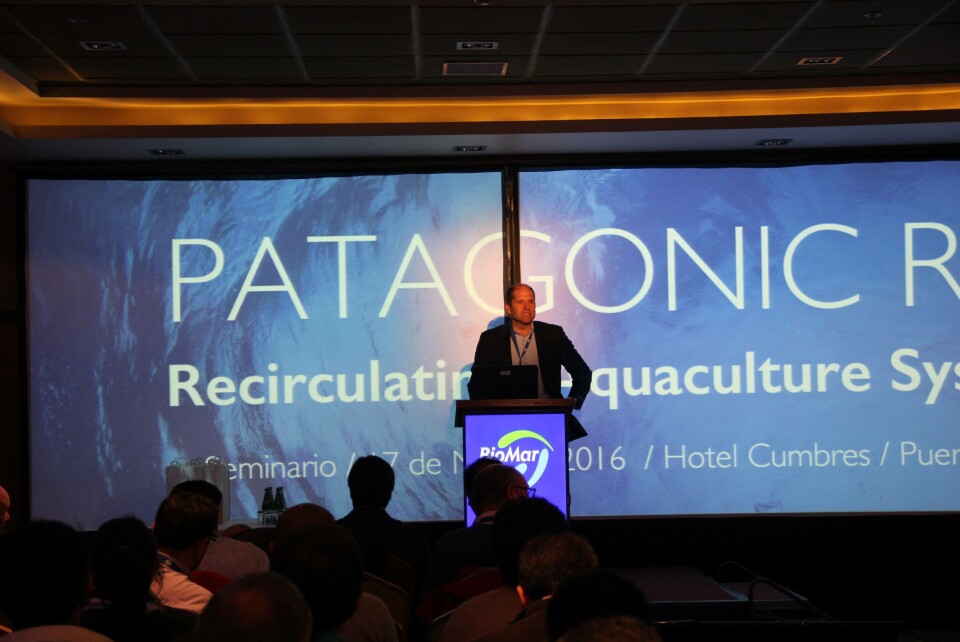
Recirc seminar makes southern debut
Biomar held its first ‘Patagonic RAS’ seminar, last week, which was marked by a technical and economic approach related to production of larger fish in recirculation systems, sustainability and water quality.
The event, which was held in Puerto Varas on March 17th and attracted 140 attendees, covered issues of great interest for the freshwater production in recirculation systems, from the environmental, sanitary and economic point of view.
The seminar was opened by the general manager Chile and Vice President of Biomar Americas, Martin León, who said that the company wanted to strengthen its leadership in freshwater with this event, "not only in what we do every day with our feed and services but also through providing tools for knowledge and improvement in fish production.”
"We know recirculation systems are becoming increasingly relevant and innovation becomes more important year over year, so we must seek, together, new ways of doing aquaculture. We try, through this seminar, to provide backgrounds and data for those companies attracted to innovate in their production models, to make them more efficient and sustainable," León said.
"Patagonic RAS wants to be the most important gathering event of this kind in the Southern Hemisphere, inviting every two years national and international leaders involved in recirculation to discuss alternative approaches, work together and overcome production challenges to draw the future of this industry and the production in our country," he added.
Meanwhile, the global director of Marketing of Biomar Group, Henrik Aarestrup, commented that the company has been sponsoring a similar event - the Nordic RAS seminar - for several years. "We thought in Chile there was a lack of a meeting similar to that one held in the Nordic countries about recirculation, therefore, the goal is to keep bringing international experts to present their experiences in the years to come," he said.
“Innovation in aquaculture is very important for us, and we believe that this event can generate knowledge exchange between different regions. We are trying to connect this event in Chile with the one held in the Nordic countries so that they can exchange information and human capital," he said.
According to Aarestrup, Chile should invest in optimizing the use of existing RAS facilities. "With minimal investment you can produce larger smolts and thus reduce the impact of major environmental and sanitary challenges observed in the Chilean salmon industry," he said.
Subsequently, the director of R&D in BioMar Group Norway, Harvard Jorgensen, discussed ways of reducing faecal particles in RAS systems and the correct choice of raw materials for RAS diets.
Meanwhile, the general manager of Niva Chile, Xavier Gutierrez, referred to the harmful effects and risks for deviations in chemical and physical parameters that affect the quality of water used in RAS facilities.
Next, the manager at Biofarm (technical assistance) in Biomar for northern Europe, Mikkel Detz, commented about the challenges of producing large smolts in RAS facilities. Later, the head of Aquaculture in DTU Aqua, Denmark, Bovbjerg Pedersen, explained the benefits achieved by RAS technologies and some of the key parameters to observe.
Subsequently, the Danish ambassador to Chile, Jesper Ferslov, spoke about how strict Danish environmental legislation helped to foster innovation. While the representative of Atlantic Sapphire, Miami, Ana Maria Echeverria, talked about her experience of producing 5kg Atlantic salmon in RAS facilities.
Meanwhile, the general manager of Billund Aquaculture Chile, Marcelo Varela, talked about the increasing trend in Norway for producing post-smolts and pre-fattening fish in order to reduce production time at sea. By keeping the fish in a controlled environment for longer, and giving them more vaccines, mortalities at sea can be reduced.
Subsequently, the director of Regenerativa, Alejandro Florenzano, commented about sustainability in recirculation systems, presenting EcoBase, a calculator and environmental database of food products and building materials, which calculates environmental footprint and carbon footprint, water consumption and use of fossil fuels, among others.
Finally, the manager of operations and projects in Salmones Camanchaca, Claudio García-Huidobro, spoke about identifying where to invest in smolt production or fattening stage production in RAS systems.























































